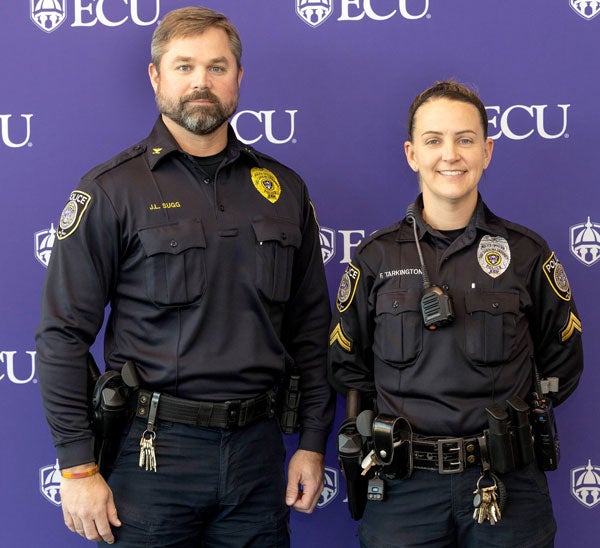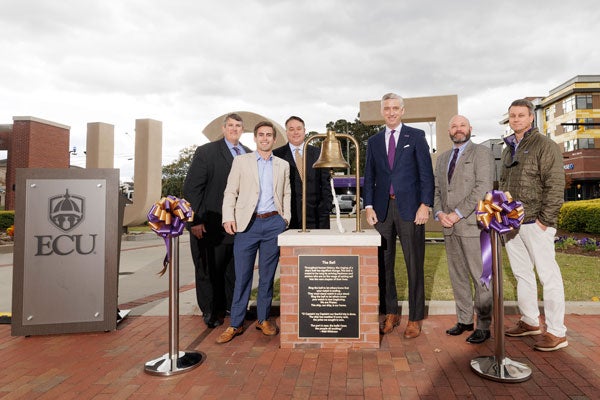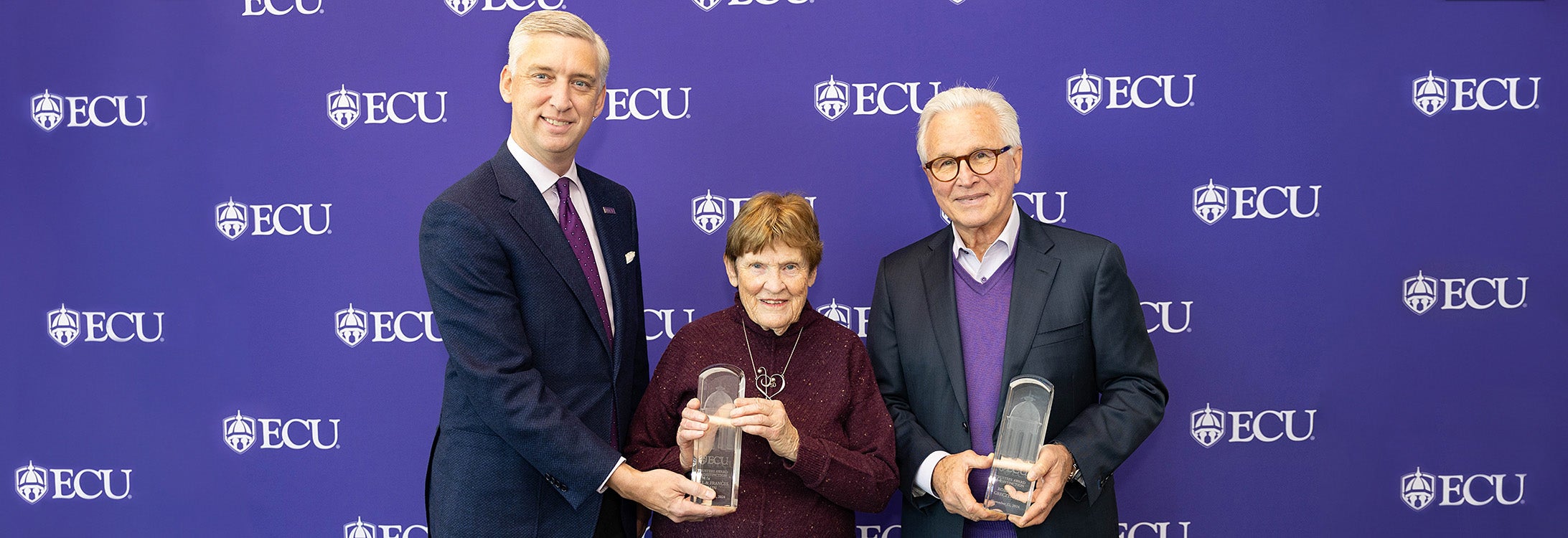Board of Trustees recognizes Pirate accomplishments
In its final meeting of 2024, the East Carolina University Board of Trustees honored alumni Bob Greczyn as well as Bill and Frances Cain with the Trustees Award for Distinction. The board also approved conferring degrees for 1,931 graduates at ECU’s fall commencement on Dec. 13.

Dr. Michelle Malkin, center, is joined by Amanda Winters, Kelly Crosbie, Dr. Allison Dannell and Dr. Heidi Bonner at a ribbon-cutting ceremony for the Gambling Research and Policy Initiative. (Photo by Steven Mantilla)
The Trustees Award for Distinction recognizes individuals who have provided extraordinary leadership to the university.
Greczyn served on the ECU Board of Trustees from 2003-11 and was the chair in his final two years. He served as the president and CEO of Blue Cross and Blue Shield of North Carolina from 2000-2010. In that role, he solidified the company’s ability to provide insurance to nearly 4 million people across North Carolina.
“Bob’s health care expertise makes him the expert in the room, but it’s his passion for serving the underserved that has helped ECU and ECU Health navigate difficult and complex challenges,” said board chair Jason Poole. He added that Greczyn’s leadership was important during the work to integrate the health system with the Brody School of Medicine’s clinical practice to create ECU Health. Greczyn currently serves as the chair of the ECU Health Board of Directors.
Bill Cain, who died in 2022, was the director of athletics from 1975-80 and also served as athletics business manager, football coach, tennis coach and golf coach. He was instrumental in the organization of the Century Club, which later became the ECU Educational Foundation, also known as the Pirate Club. In 1980 he transitioned into academics, serving as professor and assistant dean in the College of Health and Human Performance before capping a 50-year ECU career in 2018.
Frances Cain earned a bachelor’s degree in music with an emphasis in piano and organ performance. She has been the pianist and organist at St. James United Methodist Church and supports ECU students who are choral scholars at St. James. She is a regular attendee and supporter of the S. Rudolph Alexander Performing Arts Center and the ECU Opera Theatre. In 2013, she received the ECU School of Music Distinguished Alumnus Award.
“Bill and Frances Cain have lived ECU’s mission of service, and embody the motto of “Servire,” both to this institution and this community,” said Poole.
Greczyn and the Cains join Bill Clark and Dr. Jim Westmoreland who were honored as the first award recipients in 2023.
On Thursday morning, the Gambling Research and Policy Initiative (GRPI) held an open house and ribbon-cutting ceremony. Dr. Michelle Malkin, director of the GRPI, was joined by Amanda Winters, problem gambling administrator for the N.C. Department of Health and Human Services, and Dr. Heidi Bonner, chair of the Department of Criminal Justice and Criminology, in the ceremonial event. The GRPI is in the Brewster Building.
Later Thursday, the board attended a groundbreaking ceremony for the Center for Medical Education Building. The 195,000-square-foot facility is scheduled to open in 2027. ECU Chancellor Philip Rogers and Dr. Michael Waldrum, dean of the medical school and CEO of ECU Health, UNC System President Peter Hans and fourth-year medical school student Shantell McLaggan provided remarks during the ceremony.
During his remarks during the full board meeting, Rogers recognized ECU Police Department master police officer Frannie Tarkington, who was named the UNC System Law Enforcement Officer of the Year in October.
As announced last week at the annual Association of Public and Land-grant Universities (APLU) meeting, ECU received the 2024 C. Peter Magrath Community Engagement Scholarship Award as well as the APLU’s Innovation and Economic Prosperity award for Talent.
“Recognitions like these reinforce ECU’s position as a national model for community engagement and workforce development,” said Rogers. “These impacts do not happen because of a single person or a single office. They happen because of the culture of engagement and innovation we have created at ECU. This is an institution-wide effort. There are entire multidisciplinary teams across ECU that partner to do this work, to create the conditions for transformation.”
Rogers also highlighted the No. 30 ranking of the Miller School of Entrepreneurship in the Princeton Review and Entrepreneur magazine’s Top 50 undergraduate entrepreneurship programs. He also noted the accuracy of election polling done by the Center for Survey Research for presidential outcomes in North Carolina and Georgia as well as the North Carolina gubernatorial race.
ECU women’s soccer head coach Gary Higgins and student-athletes Maeve English and Abby Sowa attended the meeting as the team was honored for its 2024 American Athletic Conference tournament championship and first-ever appearance in the NCAA Tournament.

ECU master police officer Frannie Tarkington, right, stands with ECU police chief Jason Sugg after she was honored at the Board of Trustees meeting. (Photo by Rhett Butler)
Student Government Association President Anderson Ward reported to the board that SGA is making progress creating a student wellness day. Ward thanked Ben Omuya, parking services supervisor, for his assistance in implementing the Food for Fines initiative, which allows students, faculty and staff to donate canned food or personal hygiene items to pay for parking citations over a two-week period in November. The items are donated to the Williams-Ross Purple Pantry.
After the meeting adjourned, Ward and the trustees dedicated the Boneyard Bell located near the ECU letters outside of the Main Campus Student Center. The Boneyard Bell is part of a new tradition where students first ring the bell when they start at ECU and ring it again after they graduate. John Gill, assistant director for facility services, first alerted Ward of the bell’s existence.
“In early August, I received an email from John informing me that there was a bell sitting in his office related to SGA,” explained Ward. “He sent several images including the bell, the plaque commissioned by the 2011-12 SGA administration, the original concrete base as well as some background information. At first, I was unsure what we could do to repurpose the bell, but I knew we had an opportunity to create something special.”
Ward and the SGA worked with Dr. Dean Smith, director of student centers, and his staff to find a suitable location. A concrete slab was donated and facility services built a brick foundation.
As part of the consent agenda, the board:
- Approved the naming of a gate at Johnson Stadium for James and Suzanne Chesnutt.
- Approved a housing lease for the Coastal Studies Institute.
- Approved advance planning requests for Eakin Student Rec Center roof repair, the relocation of Starbucks in Joyner Library, parking lot resurfacing and safety improvements, restroom renovations in Brewster Building Wing A, and steam and condensate piping in Fletcher Hall to Jones Hall
- Approved a request to demolish Scales Field House. Offices in it will move to the Ward Sports Medicine Building.
In other business:
Trustees from two committees — strategy and innovation and university affairs — met jointly Thursday to hear a presentation on student retention, persistence and graduation rates at ECU. Academic affairs, student affairs and IPAR officials led the presentation on UNC System performance metrics and how that ties to student success and fiscal health.
This was the first in a planned three-part series to help trustees better understand enrollment trends and ECU’s enrollment management strategy. Factors include the arrival of the enrollment cliff, increased competition, changing student mix and evolving workforce needs. Additional sessions are planned for February and April.
Vice Chancellor for Advancement Christopher Dyba announced the launch of the university’s Chancellor’s Scholars initiative during a presentation to the Athletics and Advancement Committee. He said scholarship fundraising will fuel the university’s effort to recruit and retain “gifted and great students, who we want to be Pirates.”
The Budget, Finance and Infrastructure Committee approved proposed increases in tuition and mandatory fees along with increases in parking fines and other changes to parking rates. Approved by the full board, the tuition, mandatory fees and housing for dental student increases go to the UNC Board of Governors for approval.

From left, Board of Trustees chair Jason Poole, SGA president Anderson Ward, Director of Student Centers Dr. Dean Smith, Chancellor Philip Rogers, Vice Chancellor of Student Affairs Dr. Brandon Frye and Assistant Director for Facility Services John Gill stand around the newly dedicated Boneyard Bell. (Photo by Steven Mantilla)
Tuition would rise 5% for resident and non-resident graduate students, or $238 and $895 respectively. That would put tuition at $4,987 for residents and $18,793 for non-residents. The last graduate student tuition increase was in 2017.
Dental school tuition would rise 6.7%, or $2,360, to $37,507.
Fee increases would affect all students. The total increase in fees would be $77 each academic year, or a 2.65% increase.
The Committee on Strategy and Innovation heard about changes to metrics in the Carnegie Classification of Institutions of Higher Education. The classification categorizes U.S. colleges and universities based on research activity, institutional characteristics and mission. It is a key metric that can influence a university’s strategic decisions, reputation, funding and ability to achieve its goals, according to committee notes.
Mushtaq Gunja, Carnegie’s executive director, told the committee that the analytic points used in the classification had not changed in 50 years but are being updated for new classifications scheduled for official release in the spring of 2025.
“We’re moving to a better and clearer set of metrics,” he said.
He said the changes would provide a more well-rounded look at universities, including ECU.
The Audit, Enterprise Risk Management and Ethics Committee learned about the student-athlete transfer landscape and football recruiting timeline from Alex Keddie, senior associate athletics director for compliance during their updates.
The University Affairs Committee discussed changes to faculty tenure performance review and unit academic program review.
The next meeting of the ECU Board of Trustees is scheduled for Feb. 6-7 in the Main Campus Student Center.
